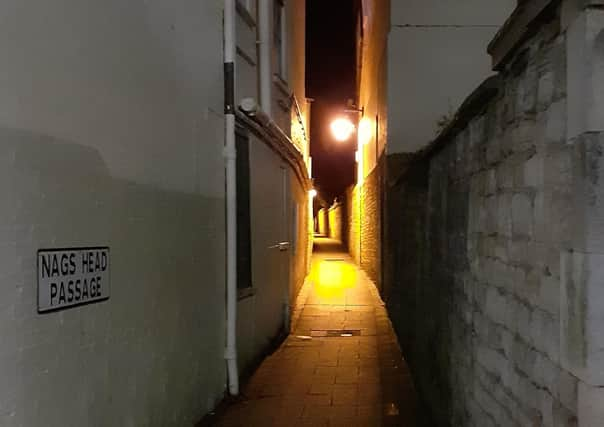How can we ensure our Sleaford streets are safe?


In the wake of the Sarah Everard murder, Prime Minister Boris Johnson is doubling funding of the Safer Streets fund to £45m, with more money for better lighting and CCTV, as well as expanding pilots of a “Project Vigilant” scheme, with undercover police patrolling bars and clubs at night.
Sleaford police have increased patrols in the area around the railway station and Nags Head Passage after recent anti-social behaviour and damage.
Advertisement
Hide AdAdvertisement
Hide AdTown and district Councillor Robert Oates went on the beat with Sleaford policing team to experience problem sites for residents. He said Nags Head Passage has long been the scene of anti-social activities and crimes such as vandalism and suspected drug dealing. He said: “The long and narrow passageway with its various entrances and exits is a particularly difficult spot for the police to monitor. A CCTV strategically located at the mid-point of the passage could be useful here.”
However, local authorities have so far been unable to find funding. As chairman of Sleaford’s Police Community Liaison Panel, Coun Oates will be taking this up and any potential funding sources with North Kesteven District Council and the Police and Crime Commissioner, Marc Jones.
Coun Oates said “The police need assistance in deterring these suspects and gathering evidence against them.”
Mr Jones intends to bid for the new funding to make the county’s streets safer for women, although the county council against reversing its money saving policy of partially turning street lights off.
Advertisement
Hide AdAdvertisement
Hide AdLincolnshire Police and Crime Commissioner Marc Jones says he will be “tireless” in about securing the new Government money for projects to make the area’s streets safer streets for everyone.
He said his office has brought in £14 million of additional funding to prevent and tackle crime, much addressing issues affecting women and girls. “I have already secured funding for CCTV from the first round of Safer Streets funding – with another three bids from the second fund pending,” he said.
Lincolnshire County Council in 2016 agreed to turn lights off at midnight or even earlier to save money, despite people complaining of feeling more unsafe.
Karen Cassar, assistant director for highways at Lincolnshire County Council, said: “I can completely understand why some residents, especially women, might feel concerned for their own safety after Sarah Everard’s tragic disappearance in London.
Advertisement
Hide AdAdvertisement
Hide Ad“I know many women – from Lincolnshire and around the country – who don’t feel safe alone after dark, even where there are streetlights, and also long before midnight which is when some in Lincolnshire are turned off. Unfortunately, the issue of women’s safety is about much more than streetlights.
“In 2018, two years after we made the switch to part-night lighting for some of our lights, the police confirmed they’d found no impact on night-time crime levels as a result of the change. They said then, and have said since, that if they ever did have any concerns, they’d let us know and of course we’d work with them to see how streetlighting could help.”
Parish, town or district councils can apply to convert streetlights back to all night for a one-off payment, but only four have been restored in this way.
Mr Jones has praised an idea to pilot voluntary night stewards in more populated areas of the county so young people feel safer walking at night.
Advertisement
Hide AdAdvertisement
Hide AdSuch patrols would not come into being until after the upcoming elections and would require a partnership approach with councils and police.
The scheme was proposed by Lincolnshire’s Youth Commission, established last summer by the PCC to give young people a voice in policing, crime and community safety. They have identified five key priorities – mental health, hate crime, abusive relationships, night-time safety and police relations.